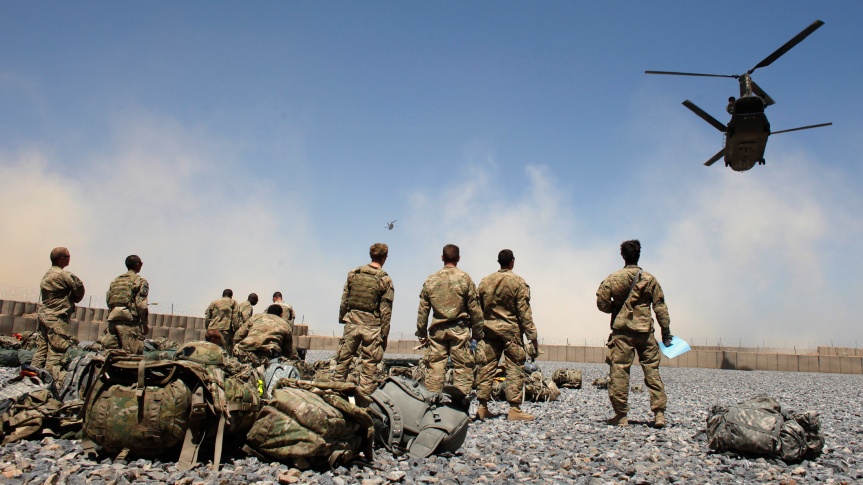
W.J. Astore
Inspired by three recent articles at TomDispatch.com, I’d like to suggest why America’s wars never end.
The first article marking the 30th anniversary of the fall of the Berlin Wall is by James Carroll. It brought me back to when I was a young Air Force captain on active duty. All of us in the military were surprised when the wall came down. Soon the Soviet Union would collapse as well. I know because I got a certificate signed by President G.H.W. Bush congratulating us for winning the Cold War.
In the early 1990s there was much talk about a New World Order (largely undefined) and a Peace Dividend. The “new” world order quickly became global military adventurism for the U.S. and the peace dividend withered as Desert Shield/Storm and other operations commenced.
I recall some personnel cuts, but no real cuts in weaponry. And no change to strategy. NATO remained even though the Warsaw Pact had dissolved. Indeed, NATO would soon be expanded (in the cause of peace, naturally), even as U.S. imperial ambitions grew. It was the “end of history” and the U.S. had triumphed, or so we thought.
But why had we triumphed? Apparently the lesson our leaders took from it was that military strength was the key to our triumph, therefore more of the same would lead to new triumphs. Pax Americana was not about democracy or freedom: it was about weapons and wars. Peace through military strength (and destruction) was the driving philosophy.
Unbounded ambition and unbridled power – that was the new world order for America. The wall came down in Berlin, but it didn’t come down in our minds. Instead of an open society, Fortress America became the norm.
The second article is by Allegra Harpootlian and focuses on the “collateral damage” (murdered innocents) of America’s global bombing and drone campaigns. It made me think of a conversation I had with a student; he’d been in the U.S. Army and fought in Afghanistan. Basically, he described it as a dirt-poor country with a primitiveness that seemed Biblical to him. He got me thinking about how we “see” people like the Iraqis and Afghans as less than us. Different. Inferior. Primitive. From another time, and from another place.
So, when Americans kill civilians in those places, it’s almost like it’s cinematic, not real, “a long time ago, in a galaxy far, far away.” We just move on.
Of course, Americans are not encouraged to be empathetic people. The world is supposed to revolve around us. “You can have it all.” In a world of selfies, why care about others? Look out for #1!
To put a bow on this, consider evangelical Christianity and the prosperity gospel. (The idea God will reward you with material goods and money as a sign of righteousness.) Remember when charity to others was valued? Not anymore.
Another way of putting this: In America there’s a huge market for self-help books, videos, etc. But where are the books and videos encouraging us to help others?
The third article is by Andrew Bacevich and specifically addresses the never-ending nature of America’s wars. His piece made me think of Congresswoman Tulsi Gabbard, who as a presidential candidate has called for an end to regime-change wars (though not the war on terror). For her pains, she’s been accused of being a Russian asset by Hillary Clinton & Company.
Why is this? Because there’s just so much money – literally trillions of dollars – at stake here, and the military-industrial-congressional complex knows how to protect itself.
The Complex offers or supports hundreds of thousands of decent-paying jobs, building weapons, staffing think tanks, and so forth. President Trump may have voiced some skepticism about America’s failed and failing wars, yet he keeps giving the Pentagon more money. Hence the wars will continue, no matter what sounds come out of Trump’s mouth.
As Tom Engelhardt has noted, for the Pentagon, failure is success. Naval accidents mean the Navy needs more money. Failed wars mean the military needs more money to replace weaponry, “modernize,” and prepare for the next round. Defeat is victory, as in more money.
To recap, America’s wars persist because a martial imperialism is our new world order; because we have limited empathy for others, especially darker-skinned “primitives”; and because war is simply a thriving business, the Washington way to rule.
Here’s a final, bonus, reason America’s wars persist: thoughtfulness is not valued by the U.S. military. Another “t” word is: toughness. The U.S. military would rather be strong and wrong than smart and right.
For all the “think” tanks we have inside the Washington beltway, what matters more than thought is toughness. Action. Making the other guy whimper and cry, to cite President Trump. This is yet another reason why America loses. We prefer to act first, then (grudgingly) think, then act some more.
Thinking implies prudence. Caution. Restraint. Patience. Un-American qualities!
Here I think of U.S. officer performance reports, which also stress action, results, even when the results are “fragile,” “reversible,” or even made up. How many officers have been promoted on pacification campaigns that pacified no one? On training efforts, e.g. for the Iraqi Army, that trained no one? On battles or skirmishes “won” that had no staying power? Remember that Petraeus Surge in Iraq?
In a nutshell, perhaps we wage war without end simply because we want to. We’ll stop when we wake up from our madness – or when someone makes us stop.











 Trump gets a soccer ball from Putin. A win-win?
Trump gets a soccer ball from Putin. A win-win?